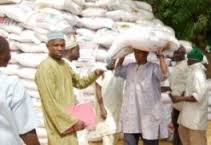The use of fertilizer as part of components for making improvised explosives by insurgents in Borno State, a practice brought to national attention over four years ago, has persisted.
According to investigation by the News Agency of Nigeria, this has led to scarcity of the farm input thus negatively affecting agricultural productivity in the state.
Some of the farmers in the state told NAN that generally, insurgency has affected farming as a business or pastime because most farmers can no longer work without fear on their farms.
NAN reports that for farmers in the state, the security challenges have made it difficult to cultivate “crops they want”, but rather make do with “crops they can cultivate” under the prevailing circumstances, whether cash or food crops.
Chairman of Rice Farmers Association in Borno, Alhaji Bulama Maina, reaffirms that the insecurity in the state still affects agriculture as a result of the restriction placed on the procurement and movement of fertilizer by security agents.
“Our farmers hardly get fertilizer due to its ban for security reasons as it is being used by insurgents to manufacture improvised explosives,” Maina reaffirmed.
He called for more commitment to end the insurgency by all stakeholders for peace to return to the state and the North-East zone in general.
Maina said a peaceful atmosphere will enable farmers engage in their trade and increase agricultural productivity.
Alhaji Allamin Umara, Chairman of All Farmers Association of Nigeria in Borno, says insurgency has affected both cash and food crops production.
Umara said the development has deprived many farmers in the state, the opportunity to benefit fully from government support, such as the Anchor Borrowers’ Programme.
“A place like the shores of Lake Chad, where you have vast and fertile land for production of crops such as wheat, rice and maize in large quantities, is no longer safe because of insurgency,” he said.
On support from organisations, Umara said Food and Agriculture Organisation, and, International Committee of the Red Cross have supported some farmers with seedlings and cash.
“The North East Development Commission had also collected data of our members; we are looking forward to its support for dry season farming,” he said.
Bello Buba, a farmer in Gwoza Local Government Area, known for large scale sesame and tiger nuts production, said insurgency has reduced production by about 80 per cent.
“Most farmers are in camps or settlements for several years now, and that has seriously affected sesame and tiger nuts production,” Buba lamented.
NAN recalls that in 2016, the Agriculture Minister at the time, Audu Ogbe, lamented at a town hall meeting in Abuja that fertilizer became scarce in parts of the country because insurgents were using it to produce explosives. (NAN)














